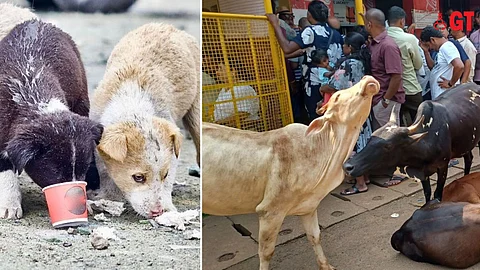

Goa's animal welfare programme continues to be dogged by significant challenges that the government authorities haven't been able to address. The challenges range from inefficient waste management to legal and social barriers that hinder the protection of animals. Here's actually what ails Goa's animal welfare efforts:
INADEQUATE GARBAGE MANAGEMENT
The stray dog presence on Goan roads is “highly associated” with garbage management, according to veterinary doctor Dr Karlette Ann Fernandes, who spoke at an interactive MOG Sunday session held at the Museum of Goa in Pilerne, on the subject of "Animal Rights in India".
She addressed issues of public relevance like the ongoing stray dog conundrum and dog bite incidents in recent times, some of which have turned out to be fatal.
“It (stray dog presence) is highly associated with the way we manage our garbage. And dogs being dogs, they have domesticated around humans,” she said, drawing a link between the presence of garbage and the emergence of stray dogs in a particular area.
RANDOM RELOCATION
Fernandes said that the Animal Birth Control Rules, 2023, in force in the country, threw a protective shield around community dogs.
“One of the rules says that community dogs have the right to live in the territory where they were born. So relocation of dogs, just picking up dogs because you don't like them from one place and then leaving them on a hill to fend for themselves, is against the law,” she said.
UNNECESSARY CONFINEMENT
Pet behaviour, the animal expert said, was largely defined by how pets are kept and conditioned. “When animals are confined for too long, they end up building frustrations. Most of the conflict is because the animal is not socialised enough and it has (a sense of) frustration of its own, as a result of the way it is brought up in that environment,” she said.
"Prospective guardians of such pets should first understand whether they can provide the correct environment for the animal that they are adopting,” she added.
CRUELTY TO ANIMALS
Fernandes said that indiscriminate slaughter of chickens in stores in public spaces was also against the letter of the law of the land.
“One of the glaring things that come to mind are all the corner chicken shops we have around everywhere. None of them are legal as per the regulations,” she said, adding that animal slaughter has to be carried out in designated slaughterhouses.
In the course of her interaction, Fernandes further said that while the use of animals in sports like bullfights is illegal, she also pointed towards a growing trend where fighting bulls are plied with contraband medicine to give them an aggressive edge.
“Those animals should not be used as animals for fighting. But they now use contraband medications to make the animals more aggressive to have a more impactful conflict between the two animals,” Fernandes said.
NEED FOR HOLISTIC APPROACH
Fernandes, who has also played a part in the very successful Mission Rabies in Goa, said that the local strain of rabies had been eradicated from Goa and the rare cases that crop up were linked to rabies virus strains from outside the State.
The veterinarian was trying to point out the fact that Goa needs a holistic and coordinated approach to deal with challenges facing its animal welfare programme to benefit both the animals and the people of the State.